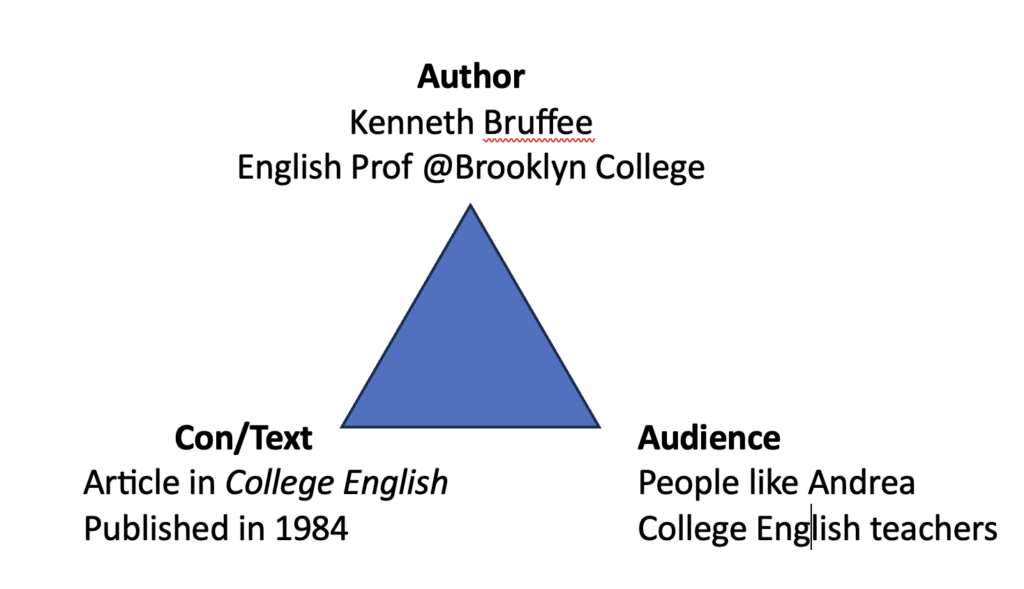2/1: Kenneth Bruffee Introduces Collaborative Learning to College English Teachers
RHETORICAL SITUATION
We’ll begin by orienting ourselves to Bruffee’s “Collaborative Learning and the ‘Conversation of Mankind'” by understanding the rhetorical situation of this piece. In other words, we will chart what we know about the author, audience, and text to take stock of the information we have going into this reading.

Group Work
In your groups, (quickly) answer the following questions. You should use textual evidence from Bruffee’s article, and I welcome you to use any relevant personal evidence, as well:
- Group 1 (pp. 638-641): According to Bruffee, what is the relationship between thought and community?
- Group 2 (pp. 641-644): According to Bruffee, what is the relationship between thought, conversation, and writing?
- Group 3 (pp. 645-647): How does Bruffee describe Thomas Kuhn’s understanding of scientific knowledge? What is the relationship between scientific knowledge & collaborative learning?
- Group 4 (pp. 647-649): Define “abnormal discourse.”
- Group 5 (pp. 649-652): According to Bruffee, how does collaborative learning for college students affect their authority in a college classroom or their community of peers?
After we share as a large group, we’ll look together at p. 642, where Bruffee describes what I’ll call a discourse community: “A community of knowledgeable peers is a group of people who accept, and whose work is guided by, the same paradigms and the same code of values and assumptions.” These knowledge communities can be those in school (like English majors), but they can also be outside of school: gaming communities, sports fans, professional or job-related groups, belonging to any teams, extracurricular clubs, cultural organizations, religious affiliations, and more.
Take a few minutes to make a list of the specific discourse communities to which you belong. Based on this list, describe one or two times that you’ve collaborated with “knowledgeable peers” in that specific community. What was the goal that you worked towards? What did you teach your peers? What did you learn from your peers? Describe your accomplishments.
IN-CLASS & OUT-OF-CLASS WORK
We’ll spend the last 10 minutes of class working in your groups to post your in-class writing as a draft of a blog titled something like “A Brief History of My Collaborative Past.” I will circulate to ensure that your websites are moving forward according to my expectations and help answer questions. You should draw on the expertise of your group members, as well.
By Tuesday, 2/6, you should have composed a blog post of no less than 300 words about your collaboration within a discourse community to which you belong. In your post, quote or summarize Bruffee. Please also include a citation (as I’ve done below). Remember to engage some of the questions above: What was the goal that you worked towards collaboratively? What did you teach your peers? What did you learn from your peers? Describe your accomplishments.
Work Cited
Bruffee, Kenneth. “Collaborative Learning and the ‘Conversation of Mankind.'” College English, vol. 46, no. 7, 1984, pp. 635-652.

